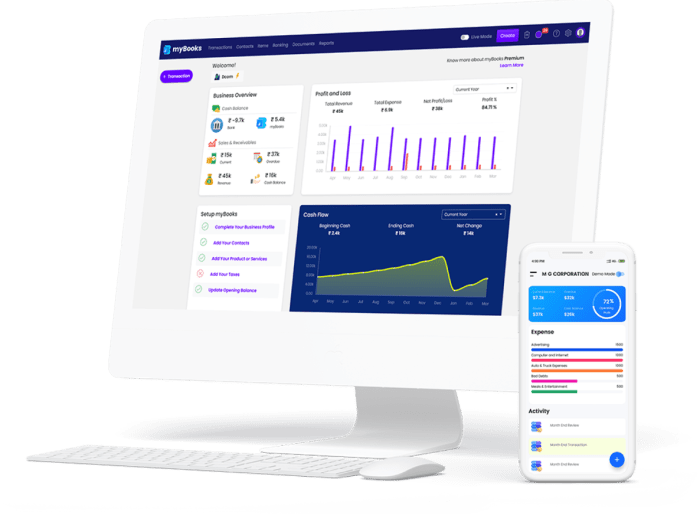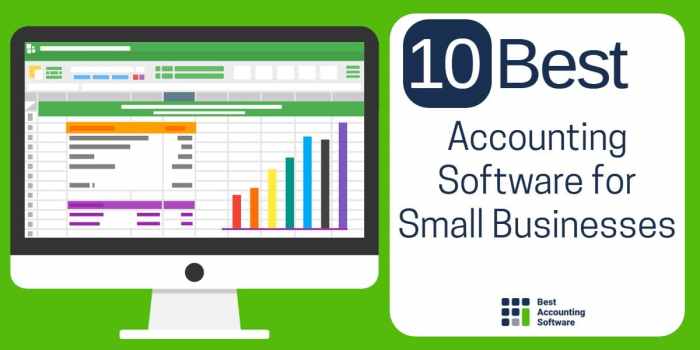Easy accounting software for small business – Running a small business is challenging enough without the added headache of complex accounting. Fortunately, numerous easy accounting software options cater specifically to the needs of small business owners, offering streamlined solutions to manage finances, track expenses, and generate reports. This comprehensive guide will explore the key features, benefits, and considerations when choosing the right accounting software for your small business.
We’ll delve into various options, highlighting their strengths and weaknesses to help you make an informed decision.
Understanding Your Accounting Needs
Before diving into specific software options, it’s crucial to assess your business’s unique accounting requirements. Consider the following factors:
- Business Size and Complexity: A sole proprietorship will have simpler needs than a growing LLC with multiple employees and inventory.
- Industry Specific Needs: Certain industries (e.g., retail, construction, restaurants) may require specialized features like inventory management or job costing.
- Accounting Knowledge: Choose software that aligns with your comfort level and accounting expertise. Some are more intuitive than others.
- Budget: Software options range from free to several hundred dollars per month. Determine your budget before you start your search.
- Scalability: As your business grows, you’ll need software that can adapt to your evolving needs without requiring a complete system overhaul.
- Integration Capabilities: Consider whether you need integration with other business tools, such as payroll software, CRM, or e-commerce platforms.
Top Features to Look for in Small Business Accounting Software
Effective accounting software streamlines various financial tasks. Essential features include:
Invoicing and Billing
Efficient invoicing is critical for timely payments. Look for software that allows you to create professional invoices, track outstanding payments, and automate recurring billing.
Expense Tracking
Accurate expense tracking is crucial for tax purposes and financial analysis. Good software should allow you to categorize expenses, upload receipts, and generate expense reports.
Financial Reporting, Easy accounting software for small business
Generate essential reports like profit and loss statements, balance sheets, and cash flow statements to monitor your business’s financial health. Look for customizable reporting options.
Bank Reconciliation
Automate the process of reconciling your bank statements with your accounting records to ensure accuracy and identify discrepancies.
Inventory Management (if applicable)
For businesses with inventory, this feature tracks stock levels, manages orders, and helps prevent stockouts or overstocking.
Payroll (optional, but often integrated)
Some accounting software integrates payroll processing, simplifying this crucial administrative task.
Tax Preparation Support
While not all software directly prepares taxes, many offer features that simplify tax preparation by organizing financial data.
Popular Easy Accounting Software Options for Small Businesses
The market offers a wide range of accounting software. Here are a few popular and user-friendly options:
Xero
Known for its user-friendly interface and robust features, Xero is a cloud-based solution popular among small businesses. It offers excellent invoicing, expense tracking, and reporting capabilities. It integrates well with other business applications. [ Xero Website ]
QuickBooks Online
A long-standing leader in accounting software, QuickBooks Online provides a comprehensive suite of features suitable for various business sizes. It offers various plans to cater to different needs and budgets. [ QuickBooks Online Website ]
FreshBooks
FreshBooks is particularly well-suited for freelancers and small businesses that prioritize invoicing and client management. Its intuitive interface makes it easy to create and send invoices, track time, and manage expenses. [ FreshBooks Website ]
Zoho Books
Zoho Books offers a comprehensive suite of accounting features at a competitive price point. It’s a cloud-based solution known for its scalability and integration with other Zoho applications. [ Zoho Books Website ]
Wave Accounting
For businesses with limited budgets, Wave Accounting offers a free plan with core accounting features. While the free plan has limitations, it’s a great option for startups or businesses with basic accounting needs. [ Wave Accounting Website ]
Choosing the Right Software: Key Considerations
Selecting the right software depends on your specific requirements. Consider these factors:

Source: zetran.com
- Ease of Use: Choose software with an intuitive interface that’s easy to learn and navigate.
- Scalability: Ensure the software can adapt to your growing business needs.
- Customer Support: Reliable customer support is essential, especially when encountering issues.
- Integrations: Check for integrations with other business tools you use.
- Pricing: Compare pricing plans and features to find the best value for your money.
- Security: Ensure the software provider employs robust security measures to protect your financial data.
Frequently Asked Questions (FAQ)
- Q: What is the best accounting software for small businesses? A: The “best” software depends on your specific needs. Consider the factors discussed above (business size, industry, budget, etc.) to determine the most suitable option.
- Q: Is cloud-based accounting software secure? A: Reputable cloud-based accounting software providers employ robust security measures to protect your data. However, it’s crucial to choose a provider with a strong security track record.
- Q: How much does accounting software cost? A: Costs vary widely depending on the software and features. Options range from free plans with limited features to monthly subscriptions costing several hundred dollars.
- Q: Can I switch accounting software easily? A: Switching software can be time-consuming, but it’s usually possible. Many providers offer data import/export features to facilitate the transition.
- Q: Do I need accounting software if I’m a sole proprietor? A: Even sole proprietors benefit from accounting software. It simplifies record-keeping, tax preparation, and financial analysis.
Conclusion: Easy Accounting Software For Small Business
Choosing the right easy accounting software is a crucial step in managing your small business finances effectively. By carefully considering your needs and exploring the various options available, you can find a solution that streamlines your accounting processes, improves financial visibility, and ultimately contributes to your business’s success.
Call to Action
Ready to simplify your accounting? Explore the options mentioned above and choose the software that best fits your business’s unique needs. Start your free trial today and experience the benefits of efficient accounting!
Question Bank
What are the key features to look for in small business accounting software?

Source: sparebusiness.com
Essential features include invoicing, expense tracking, financial reporting, bank reconciliation, and ideally, integration with other business tools.
Is cloud-based accounting software better than desktop software?
Cloud-based software offers accessibility from anywhere, automatic updates, and often better collaboration features. Desktop software might be preferred by those prioritizing offline access and control.
How much does easy accounting software typically cost?
Pricing varies widely depending on features and the number of users. Many options offer free plans for basic needs, while more comprehensive packages can range from a few dollars to several hundred per month.
